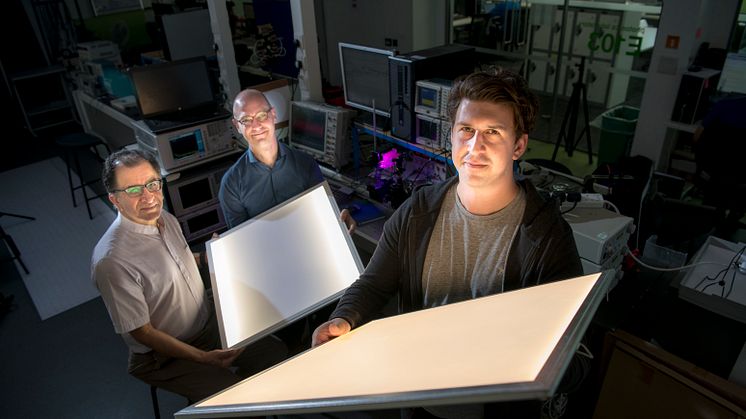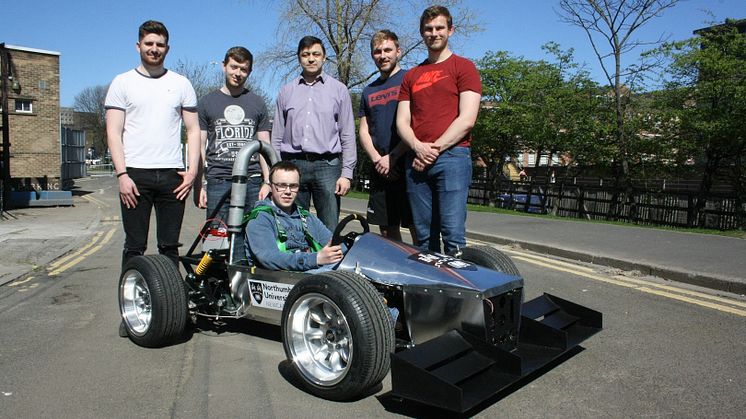
Press release -
LiFi research to revolutionise data downloads
A new form of high speed wireless internet, which uses the lights in homes and offices to transmit data, could revolutionise the way we download and upload information in the future.
Researchers from Northumbria University, Newcastle and UCL are developing a new type of organic LED (light-emitting diode) which will communicate with smart devices such as tablets and phones to download and upload huge amounts of data.
Known as ‘LiFi’ the new technology uses visible light communication to transmit information – with lights such as those found in the ceiling of buildings turning on and off at a very high speed, not visible to the human eye, to communicate with LEDs in phone or tablet screens.
LiFi based links are much faster than WiFi, which uses radio frequency waves, meaning that a film which may take an hour to download using WiFi could take just seconds using LiFi, with live streaming also much easier and reliable.
The research being carried out by Northumbria and UCL focuses on the creation of a new low-cost, plastic all-organic LED which will be used to develop the world’s first complete visible light communications system.
Project lead Zabih Ghassemlooy is Professor of Optical Communications at Northumbria University and also heads up Northumbria’s renowned Optical Communications Research Group.
He said: “In the future almost all the lights we use in our homes and offices will be LED – they are cheaper, greener and more efficient, using up to 10 times less energy than traditional incandescent or fluorescent lights.
“Given the increasing amount of data we are all using, it therefore makes perfect sense to develop this LiFi technology so we can use our existing lighting infrastructure to provide fast internet in the future.
“The new LEDs being developed at UCL during this project not only provide light but will have additional functionality to allow them to communicate with other electronic devices, not only delivering data but receiving it back as well.”
As well as the increased speed, LiFi could deliver additional benefits over WiFi, including not exposing users to radio frequency radiation and being safe to use in areas such as hospitals, where WiFi cannot be used due to the electromagnetic interference it causes.
With its ability to allow electronic devices to communicate with each other, LiFi could also successfully be used within homes and work places, as well as for car-to-car communications; underwater communications systems between various manned and unmanned platforms; for communication between handheld devices and as an enabler for local positioning systems.
It is envisioned that smartphones will play a major role in the delivery of LiFi networks, with the technology expected to be in everyday use in the next five to 10 years.
Dr Paul Haigh, a former Northumbria University PhD student, now a Senior Research Associate at UCL, working there with Professor Izzat Darwazeh, is also involved in the project. He said: “The LEDs we are developing are plastic, flexible devices which are cheap to make and which are already appearing in high-end mobile phones, tablets and televisions.
“We are incorporating these into a thin film, just 500 nanometers (0.0005 millimetres) thick that could be used as a smart phone or tablet screen, allowing it to act as a LiFi transmitter.
“In addition, as well as looking at how we transmit information from a light in the ceiling to an electronic device, we are the first researches to also consider how we can transfer information the other way too, allowing devices to essentially talk to each other.”
The three-year project has been funded by the Engineering and Physical Sciences Research Council (EPSRC) and will run until September next year.
The research is being led by Izzat Darwazeh, Professor of Communications Engineering at UCL; and Zabih Ghassemlooy, Professor of Optical Communications at Northumbria University. The research team also includes Professor Franco Cacialli, who leads the UCL group within the London Centre of Nanotechnology responsible for developing the novel organic devices for the project. Professor Ioannis Papakonstantinou, Dr Paul Haigh and Dr Alessandro Minotto of University College London, and Dr Hoa Le Minh and Dr Andrew Burton of Northumbria University are also involved in the research.
For more information about Northumbria’s Optical Communications Research Group visit http://soe.northumbria.ac.uk/ocr/
Hear more about the project from Professor Zabih Ghassemlooy and Dr Paul Haigh below:
Topics
Categories
About Northumbria University:
Northumbria is a research-rich, business-focused, professional university with a global reputation for academic excellence. To find out more about our courses go to www.northumbria.ac.uk
If you have a media enquiry please contact our Media and Communications team at media.communications@northumbria.ac.uk or call 0191 227 4604.
About UCL (University College London):
UCL was founded in 1826. We were the first English university established after Oxford and Cambridge, the first to open up university education to those previously excluded from it, and the first to provide systematic teaching of law, architecture and medicine. We are among the world's top universities, as reflected by performance in a range of international rankings and tables. UCL currently has over 39,000 students from 150 countries and over 12,500 staff. Our annual income is more than £1 billion.
www.ucl.ac.uk | Twitter @uclnews | YouTube channel YouTube.com/UCLTV












